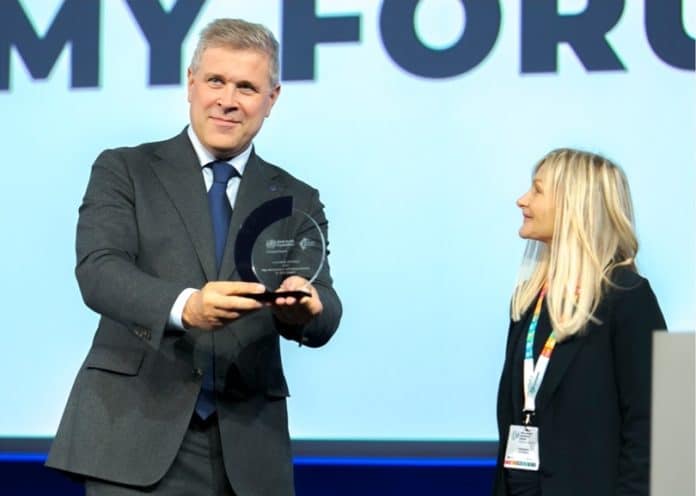WHO/Europe has presented the prestigious WHO Regional Director for Europe’s Award to the Icelandic Government for its leadership in advancing a well-being economy both in Iceland and around the world.
This recognition cements the longstanding partnership between Iceland and the WHO European Well-being Economy Initiative, which has been leading the way in redesigning the economy for more resilient and healthier societies that leave no one behind.
Ms Chris Brown, Head of the WHO European Office for Investment for Health and Development, presented the award on behalf of WHO Regional Director for Europe Dr Hans Henri P. Kluge at the Wellbeing Economy Forum, which took place in Reykjavik, Iceland, on 13 June 2024.
Collaboration and sharing across sectors
Building on the success of last year’s pioneering event, the 2024 Forum brought together more than 200 global and local leaders and experts representing more than 25 nations, 8 cities and 2 national networks. They were united around the common goal of implementing new economic policies and approaches to safeguard the well-being and resilience of people’s lives and planetary resources.
The energy in the Forum was high as participants from sectors including health, economy, finance, climate change, employment, infrastructure, education, business and civil society shared tools, metrics and innovations for implementing well-being economies, and explored
The Regional Director stressed that too many people’s fundamental needs for health and well-being are still unmet, and highlighted the importance of leadership and collaboration in advancing well-being economies.
In his opening address, Prime Minister of Iceland Bjarni Benediktsson said, “In recent decades, we have witnessed a growing movement within academia and politics advocating for policies that encourage more inclusive, equitable and sustainable societies. The underlying criticism is that we need to transition from an economic model under which we too heavily focus on growth without considering the overall well-being of the people we are trying to serve.”
The Prime Minister added, “Let me give an example: If someone does not feel safe at home, has insufficient access to health care, is without a job and has nowhere to live, is knowing that gross domestic product per capita is high going to help? Not really.”
New metrics, evidence and tools
The Forum came at a critical time, as the world faces growing inequities, demographic shifts and economic transitions. It addressed key priorities such as mental health, the inclusion of young people, adaptions for ageing societies and the development of left-behind regions. Participants discussed a wide range of evidence, approaches and best practices showing how value-based policies and investments are delivering social, human and ecological improvements in many different countries.
Participants expressed strong interest in WHO/Europe’s work on convening the finance, economy and health sectors around well-being policies and services for equitable and healthy transitions for ageing societies, youth inclusion, better mental health, and urban and rural cohesion.
Championing the well-being economy
The Icelandic leaders, including Prime Minister Benediktsson and Minister of Health Willum Þór Þórsson, were praised for their leadership in driving this agenda forward.
Ms Brown reiterated WHO/Europe’s commitment to working with Iceland and other countries to champion the Initiative. “We stand at a pivotal moment, with more countries seeing the value of well-being economies as an insurance policy for healthy transitions and sustainable development amidst the big issues of our time, including climate change, social fractures, rising poverty levels, gender backsliding, strained health and social systems, and the so-far unrealized and unequal benefits of green and digital transitions.”
She concluded, “We are delighted to be cocreating with countries and local and global partners the know-how and political will to implement solutions that can deliver healthy, prosperous lives for all in our societies.”
The WHO European Well-being Economy Initiative, launched in 2022, is led by the WHO European Office for Investment for Health and Development in Venice, Italy. In March 2023 WHO/Europe hosted the first-ever High-Level Forum on Health in the Well-Being Economy, which led to the agreement by European leaders, policy-makers and civil society on an outcome statement underpinning this area of work across WHO/Europe’s 53 Member States.

